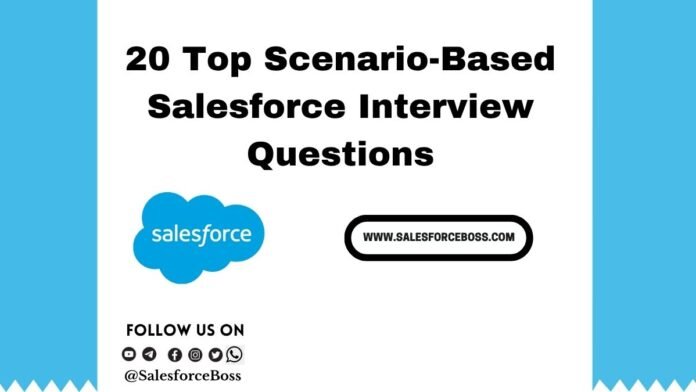If you’re preparing for your next Salesforce interview, whether as a Salesforce Administrator, Salesforce Developer, SFDC Tester, or Salesforce Consultant, this list of scenario-based questions will help you crack real-world assessments and stand out.
These questions are frequently asked by top companies like Salesforce Inc, McAfee, Cognizant, Amazon, and others. Be sure to bookmark this post if you’re serious about your Salesforce career opportunities in 2025!
✅ Check Other Salesforce Jobs Posts: Click Here
Top Scenario-Based Salesforce Interview Questions
1. How do you display when the first Opportunity was created on the Account object?
Use a Roll-Up Summary with an aggregate function (Minimum) on the Opportunity Created Date field.
2. Does a record ID change after restoring a deleted record?
No. Salesforce record IDs are unique and permanent. Once created, the ID remains the same even after undelete.
3. A user has “View All Data” and “Modify All Data” but still can’t edit certain fields. Why?
Because field-level security overrides those permissions. The user must have explicit field-level access.
4. How can you enforce a naming convention for Account records?
Use Validation Rules to compare the user input against the defined naming pattern.
5. Why can one user not see any Account records or the tab, even when all three users are on the same profile?
- Profile: Tab Hidden
- OWD: Private
- Permission Set 1 (Tab Visible): Assigned to User A & B
- Permission Set 2 (View All): Assigned to User B
User C lacks both permission sets.
6. Why can’t a user delete Contract records despite having delete access on the object?
They also need the “Contract: Delete Activated Contracts” permission at the system level.
7. How to delete 40,000 records permanently so they can’t be recovered?
Enable Bulk API Hard Delete in the user’s profile and use Data Loader with the hard delete setting.
8. How can you track old and new values of a field on the Account object?
Enable Field History Tracking on the relevant fields.
9. Priority field options vary based on Service Type. How do you achieve this?
Use Dependent Picklists in Salesforce.
10. How to avoid overlapping when running three Batch Apex classes?
Use the finish() method of one batch to start the next. This ensures they run sequentially.
11. Can you deactivate or modify a Trigger directly in Production?
No. Triggers can’t be edited directly in Production. You must deploy changes from a sandbox using a change set or metadata API.
12. What happens if a user without field access runs a class with ‘with sharing’ querying a restricted field?
No error will occur. ‘with sharing’ enforces record-level security, not field-level security.
13. Will a frozen user still receive email alerts?
Yes. Freezing a user only blocks login, not email notifications or workflow alerts.
14. How to avoid a Mixed DML error when doing DML on User and Account in a Flow?
Use the Scheduled Path in Flow to separate User and Account operations.
15. How to pass data between unrelated Lightning Web Components (LWC)?
Use Lightning Message Service (LMS) for communication between unrelated components.
16. If you have 10,000 records and batch size is 200, how many batches will run?
10000 / 200 = 50 batches.
17. Code written in the Anonymous Window runs in which mode?
It runs in User Mode by default.
18. How to access private methods in Test Classes?
Use the @TestVisible annotation to expose private methods to test classes.
19. How to fetch Accounts that have no related Contacts and Opportunities?
SELECT Id, Name FROM Account
WHERE Id NOT IN (SELECT AccountId FROM Contact)
AND Id NOT IN (SELECT AccountId FROM Opportunity)
20. Fetch Cases where Contact is associated and Owner is active
SELECT Id, CaseNumber, Owner.Name, ContactId, Contact.LastName
FROM Case
WHERE ContactId != NULL AND Owner.IsActive = TRUE
Follow Us for Daily Salesforce Jobs Hiring Update:
| Social Platform | Links |
|---|---|
| Telegram | Join Here |
| Join Here | |
| Follow Here |
Conclusion:
Preparing for scenario-based questions is essential if you’re looking to advance your career as a Salesforce developer, Salesforce administrator, or Salesforce tester. These types of questions reflect real-world situations and are commonly asked in interviews across top companies like Salesforce Inc, Salesforce company partners, and other global tech firms. Whether you’re exploring salesforce careers, applying through your salesforce developer login, or aiming to grow within the sales force com ecosystem, mastering these examples gives you a significant advantage.
This guide also helps those aiming for sfdc careers, especially roles like sfdc tester or developer sales force, where hands-on problem-solving is crucial. If you’re truly serious about your salesforce career opportunities in 2025, make sure to practice these questions thoroughly and revisit them before your next interview.

